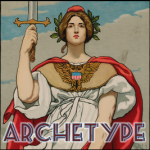 It has been widely reported that actor Jack Gleeson, who plays King Joffrey on the HBO fantasy drama Game of Thrones, looks to Joaquin Phoenix’s portrayal of Emperor Commodus in the 2000 film Gladiator for a role model on how to portray a young sadistic autocrat.
It has been widely reported that actor Jack Gleeson, who plays King Joffrey on the HBO fantasy drama Game of Thrones, looks to Joaquin Phoenix’s portrayal of Emperor Commodus in the 2000 film Gladiator for a role model on how to portray a young sadistic autocrat.
Thinking about the two stories as a writer, and contemplating an observation I made earlier this year on how the character of Ned Stark still has such a strong hold on the Thrones mythos despite his early demise, I realized that there were more parallels between the stories. After all, Marcus Aurelius dies early on in the film, yet his presence (or absence) dominates the rest of the tale.
 Would it be too finicky to insist that, as the dead father of a tyrant, Aurelius aligns more closely with Robert Baratheon than Ned Stark? Robert, unlike Marcus, was certainly no philosopher. The parallel seems clear: Aurelius is obviously Ned.
Would it be too finicky to insist that, as the dead father of a tyrant, Aurelius aligns more closely with Robert Baratheon than Ned Stark? Robert, unlike Marcus, was certainly no philosopher. The parallel seems clear: Aurelius is obviously Ned.
But, no. Remember the heartfelt conversation Robert and Joffrey had on the king’s deathbed about how Robert had failed Joffrey as a father? That’s the same scene where Aurelius tells Commodus that he failed him as a father, after which Commodus smothers his father to death. Of course, it was a boar who did the deed in Thrones.
The young tyrant, in both stories, then sets out to kill the man the dead ruler wanted to rule in his stead. Only, in the film, the tyrant fails.
In Gladiator, the Hero’s family is murdered and the Hero lives on in secret. In the Thrones books and series, the Hero is murdered and his family carries his Hero energy into the story. A bit of a reversal. In the film, the Hero Maximus carries the dead Guru Aurelius’s intentions for the realm forward, and this is what makes Ned look like Marcus.
Not to mention the fact that Robert isn’t much of a Guru. His rather cynical view of kingship, however accurate, makes him a bit of an anti-Guru.
Even so, the Hero is the Hero, and Ned still manages to define relationships in Game of Thrones several seasons after his death; defining relationships is the key to what the Hero does. Even the show’s lately arriving Prince Oberyn is defined largely by a family history determined by the life of Ned Stark.
And, while talking relationships, should we go into the vaguely incestuous relationship between Lucilla and Commodus? Incest is the ultimate cause of the tyrant in Thrones, while in Gladiator the threat of incest is an effect of the tyrant. Yet another reversal.
One last note. The cast of Gladiator is far more compressed than the cast of Thrones. This means the characters in the film will bear a lot more archetypal responsibility than those in the show, and the roles in the show will be spread over multiple characters. When you go off to do your own archetypal analysis, keep this in mind.
